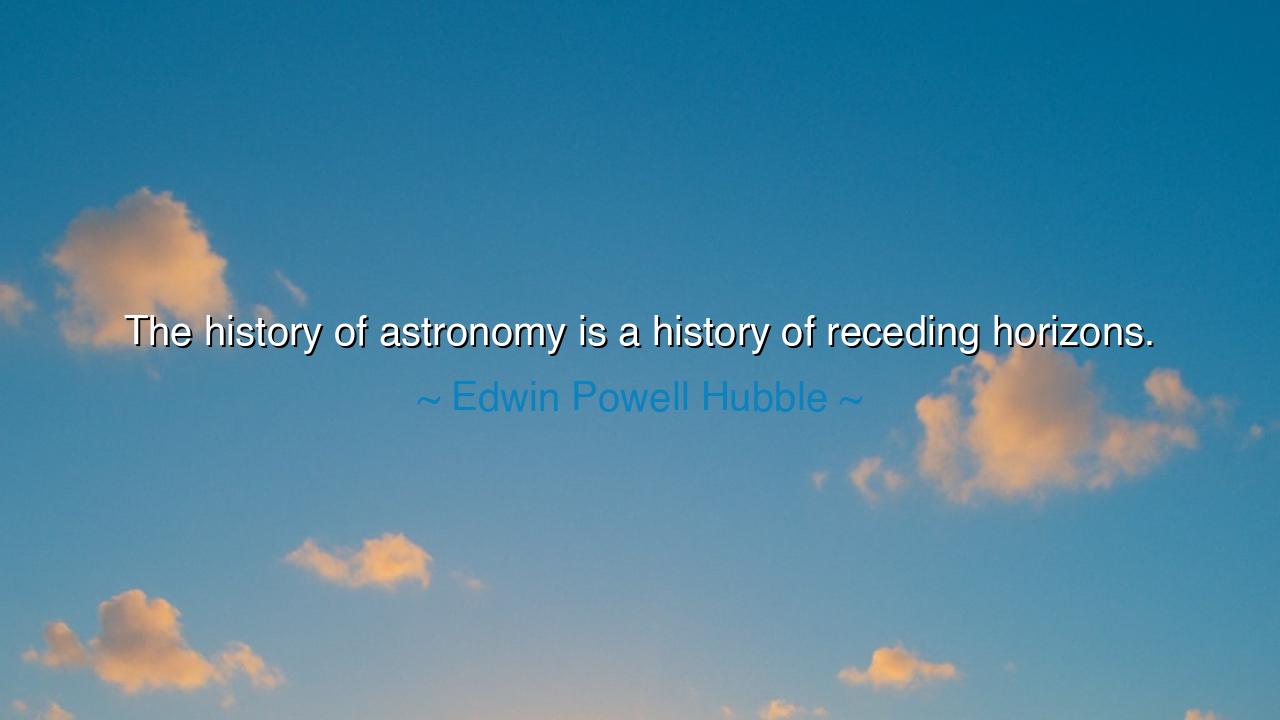
The history of astronomy is a history of receding horizons.






When Edwin Powell Hubble, the great watcher of the heavens, declared, “The history of astronomy is a history of receding horizons,” he spoke not only as a scientist, but as a seer of the infinite. His words, born from his discoveries in the vast reaches of space, remind us that every time humankind believes it has reached the edge of knowledge, that edge slips farther away. The more we learn, the more we glimpse the boundless. Thus, Hubble’s statement is both a celebration and a humbling — a testament to the endless mystery of the cosmos and to the eternal restlessness of the human spirit.
To understand the origin of this quote, one must picture the early twentieth century, when humanity’s understanding of the universe was confined to a single galaxy — our own Milky Way. The stars we saw were believed to be all that existed. But Hubble, peering through the great telescope at Mount Wilson in 1924, discovered something unimaginable: the faint, swirling light of other galaxies, vast and distant beyond comprehension. In that moment, the universe itself seemed to expand before the eyes of humankind. What was once thought to be the whole of creation became but a single island in an infinite ocean. Hubble had revealed a new horizon — and with it, the truth that horizons never end.
His discovery was not the first to shatter human certainty. Long before him, Copernicus dared to say that the Earth was not the center of the cosmos, but merely one planet among many circling the sun. His revelation displaced mankind from the throne of the universe — yet it also set the mind free. Later, Galileo, with trembling hands, turned his telescope skyward and saw moons circling Jupiter, mountains on the moon, and the phases of Venus. Each new finding broke another boundary of ignorance, each horizon receding into a vaster unknown. The history of astronomy, as Hubble said, is indeed the history of such awakenings — moments when the veil of the sky is torn open, revealing yet another layer of wonder.
But there is a deeper wisdom in Hubble’s words. For he was not only describing the heavens, but the nature of knowledge itself. All discovery, whether in science, art, or the soul, follows the same pattern: we advance, we understand, and then we realize how much more lies beyond. Each question answered births ten more. The wise do not despair at this — they rejoice. For the receding horizon is not a failure; it is an invitation. It calls us onward, reminding us that truth is infinite and that curiosity is the divine spark within us.
There is a story told among scientists that, late one night at Mount Wilson Observatory, Hubble stood silently beside his telescope after observing distant galaxies whose light had traveled millions of years to reach Earth. When asked what he felt, he replied simply, “We are witnessing the universe expand.” Those few words carried awe beyond measure — for he had realized that not only were there other galaxies, but that space itself was stretching, carrying the stars away from one another. Creation was not static; it was alive, unfolding still. What greater testament could there be to the idea of “receding horizons”? Even the cosmos, in its majesty, is forever moving, forever becoming.
Yet Hubble’s insight is not meant for astronomers alone. It speaks to every soul that dares to seek understanding. Life itself is a journey of receding horizons. Each time we think we have mastered ourselves — learned love, wisdom, or truth — life opens new depths within us. The young think they know the world; the old know that the world cannot be known. And so, to live well is to embrace the eternal unfolding, to greet each revelation not with arrogance but with gratitude. The horizon recedes because we are meant to grow endlessly toward it.
So, O seeker of the stars and of meaning, take this lesson from Hubble’s cosmic vision: do not fear the vastness of what you do not yet know. Let it inspire you. Look to the heavens as he did, not to conquer them, but to listen. For the sky teaches humility, and humility is the doorway to wisdom. Each discovery, each step of progress, is a reminder that the universe is larger than our understanding — and that this is a blessing.
And when your own life seems small beneath the endless night, remember Hubble’s truth: that every horizon is not an end, but a beginning. Whether in science, in spirit, or in the quiet journey of the heart, the path of growth is infinite — and the light that calls us forward, though distant, is our eternal guide.






AAdministratorAdministrator
Welcome, honored guests. Please leave a comment, we will respond soon